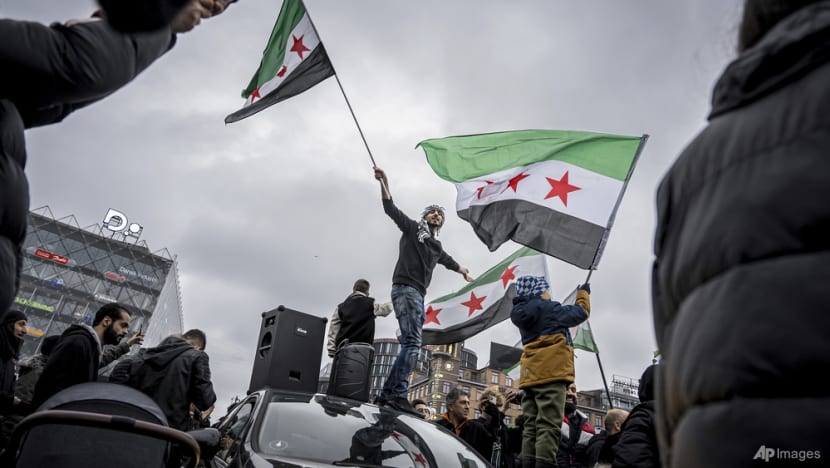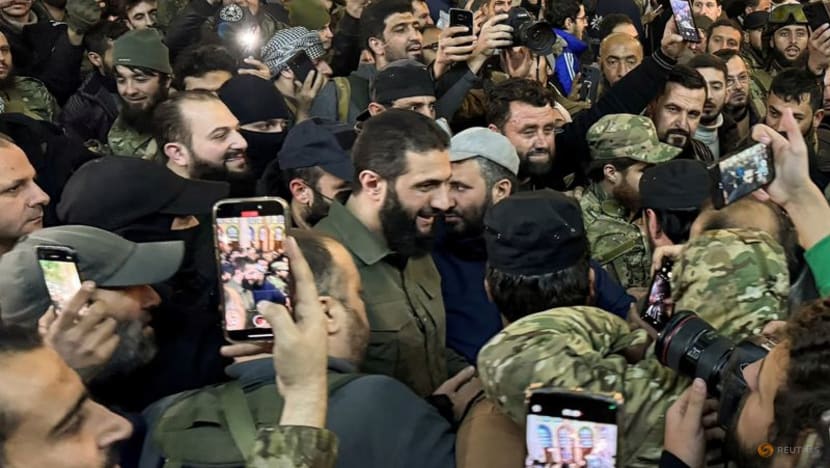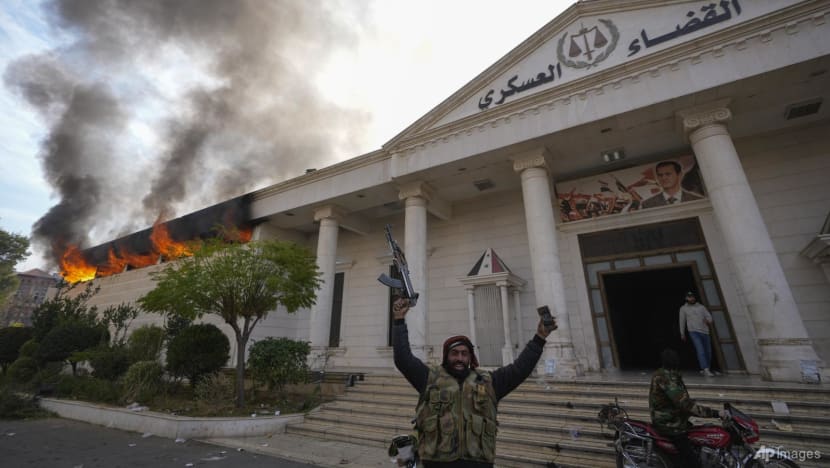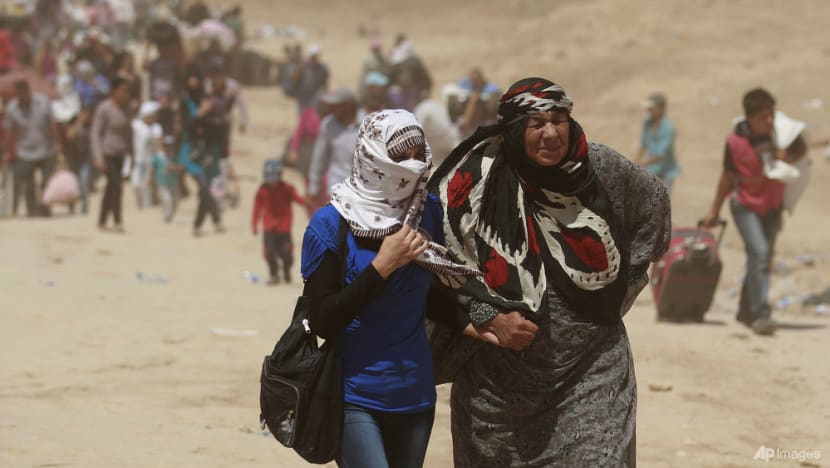Advertisement
As Syrians cheer the end of a brutal authoritarianism era, attention now turns to who will govern the country as foreign actors vie for influence.

People wave Syrian opposition flags at City Hall Square in Copenhagen, Denmark, as they cheer the ousting of Syrian president Bashar al-Assad, Dec 8, 2024. (Photo: Emil Nicolai Helms/Ritzau Scanpix via AP)
New: You can now listen to articles. 
This audio is generated by an AI tool.

09 Dec 2024 07:36PM (Updated: 09 Dec 2024 08:16PM)
As Syrians celebrate the fall of Bashar al-Assad after five decades of brutal dynastic rule, analysts cautioned the situation remains uncertain and precarious as a power vacuum emerges.
Rebels, led by Islamist militant group Hayat Tahrir al-Sham (HTS), launched a lightning offensive that captured major cities in less than two weeks, and overthrew the former president after marching into capital Damascus on Sunday (Dec 8).
It capped a devastating war that began in 2011 when Assad violently repressed anti-government protests, leading to hundreds of thousands of deaths in the years that followed and turning millions into refugees.
While the United Nations hail a “historic opportunity” for Syrians to build a better future, the question remains who will fill the leadership void amid fears that someone worse than Assad could take the reins, potentially driving the country into further bloodshed and triggering new risks for the region.
“It’s a hopeful moment for Syria, after a long, brutal dictatorship… but there is also an awful lot of uncertainty in an already very uncertain region,” said Gregory Treverton, professor of the practice of international relations and spatial sciences at the University of Southern California.
WHO WILL GOVERN SYRIA?
HTS, which led the insurgency to topple Assad, is set to be a major player in Syria’s governance.
But the militant group’s historical ties to al-Qaeda could prove tricky – it has been designated a terrorist organisation by many, including the UN, United States and Turkiye.
In 2016, the group broke links to al-Qaeda and rebranded, with commander Abu Mohammed al-Golani depicting himself as a champion of pluralism and tolerance.
Analysts said a fundamental worry is that HTS is an Islamic group, and it remains to be seen if it can find a balance with secular aspects of Syria’s society. They are also hopeful the group will form a coalition with other oppositions, instead of dominating the landscape.

“It’s going to be very difficult for groups (like HTS) to abandon their relatively strict Islamic code. How are they going to reconcile with the reality that Damascus is largely secular?” asked Aaron Miller, a senior fellow at Washington-based think tank Carnegie Endowment.
“Right now, the Shariah council of HTS does not permit representation by Kurds or Druze. This is where Islamic law is going to bump up against the more secular aspirations of how many Syrians see the future of their country.”
Syrian activist Rifaie Tammas said that while concerns over HTS remain, the immediate priority for most Syrians are the “actions on the ground”.
“We shouldn’t discount what happened in the past, why HTS was designated (as a terrorist group), their violations, etc,” he said.
“But their actions have been very promising lately… compared to the behaviour of the Assad regime, which was secular but look at what it has done – the bombardments, the half a million Syrians who died.”
INTERNATIONAL ACTORS
Analysts said the power vacuum also sets the stage for international statecraft from foreign actors who are only too eager to influence the outcome in Syria, which is fragmented among armed factions.
Russia and Iran have propped up Assad’s regime for years, but recent distractions with Ukraine and Israel respectively allowed the rebels to swoop in and upend the power balance in the region.
Stunned by the speed of Assad’s downfall, Moscow is scrambling to salvage its position, reportedly reaching out to the rebels to secure its two military bases in Syria.
Russia operates the Hmeimim air base in Syria’s Latakia province, which it has used to launch airstrikes against rebels in the past. It also has a naval facility at Tartous on Syria’s coast, which is Russia’s only Mediterranean repair and replenishment hub.
Military analysts say losing the bases would be a serious blow to Moscow’s ability to project power in the Middle East.
Miller said it is unclear how the rebels see Russia, especially after Moscow granted asylum to Assad and his family.

“How are (the Russians) going to negotiate with the new powers to secure those rights when they’re giving sanctuary to a man who’s been so brutal in murdering his fellow Syrian citizens?” He asked.
He added that while Iran is likely to continue to find ways to influence Syria, with Hezbollah – its allied Lebanese militia – crippled by Israel, it will be tough for Tehran to gain a foothold.
Treverton said the US will not be able to stay out of Syrian politics despite incoming president Donald Trump declaring “This is not our fight” on social media.
“There’s just too much at stake, too much risk of bad outcomes. So whether he likes it or not, Trump is going to have to pay considerable attention to Syria,” he told CNA’s Asia First.
Observers pointed to Turkiye as the country to watch – many believe the offensive could not have happened without the blessings of Ankara, backer of some of the opposition forces.
Miller, who is also a former diplomat who has formulated US policy on the Middle East and the Arab-Israeli peace process, said: “The big power on the block is Turkiye … (President Tayyip) Erdogan’s objectives are clear – he wants the almost 3 million Syrians in Turkiye to return home, and he wants to figure out a way to break the US connection with the Kurds.
“So, the foreign powers are going to continue to meddle in Syria, and it’s not going to make the job of reconstruction or political reconciliation any easier.”
CAN REFUGEES FINALLY RETURN HOME?
Today, at least 5.5 million Syrian refugees live in neighbouring countries including Turkiye, Lebanon, and Egypt, and around 4.5 million are believed to have fled to Europe.
Their fate remains closely pegged to their host nations’ evolving politics, with a future that looks increasingly uncertain as anti-immigration political parties gain traction in recent years.

Even before Damascus fell, many European countries had begun pushing to designate Syria as a safe country in order to return the asylum seekers.
However, analysts said those yearning to go home might have to wait, as the collapse of the regime poses other security risks. Cross-border violence and sectarian tensions could escalate, potentially triggering another refugee crisis.
“The Syrian people, whether in Syria or outside, are far away from being out of the woods. The country is bankrupt, the system is corrupt. The situation and what is coming next is highly precarious,” said Eyal Mayroz, senior lecturer of peace and conflict studies at the University of Sydney.
“So many different factions and so much animosity and hatred that are still there, that were put aside during the fight to oust the regime, may now come about.”
Still, Tammas said Assad’s ousting has been a long time coming and a “victory for all who resist authoritarianism, resist corruption, and fight for their freedom.”
The activist was forced to leave Syria in 2013 when his hometown was levelled by shellings from Assad’s forces. He lost family members in the conflict.
Tammas, now a researcher and consultant at the University of Western Sydney, said the rebels’ victory presents a new dawn for Syria. He is confident Syrians will continue fighting for a better future, regardless who comes into power.
“If any group starts dominating the scene, I think Syrians would resist. We’ve got a wealth of knowledge and experience now after 50 years of authoritarianism,” he said.
“No matter what we face, we will be able to deal with it, just like we dealt with the Assad regime.”

Comments are closed.